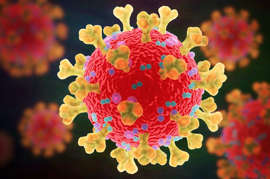Antibodies and death. Another nail hammered into the coffin lid of anti-Axis
Scientists have identified specific antibodies against the S-protein domain. Figuratively it is called a spike or spike (in English spike is a spike), and since the entire surface of the virus is dotted with these spikes, it looks like a crown.
Virology on the fingers
With such thorns, the coronavirus clings to our cells, and gets inside, where it begins to multiply. Now imagine what happens when there are many antibodies against this spine. They bind to it and block it, as a result, the spine cannot adhere to the cell, the virus cannot penetrate into it and multiply. When there are a lot of antibodies, most of the spines are blocked, and the virus attack dies as soon as it starts.
This introduction is needed to better understand the essence of the research. Scientists evaluated 92 patients with severe COVID-19 admitted to the intensive care unit. During treatment, they were examined in detail. And then we looked at how blood counts correlate with the outcome of therapy, with those who were lucky and who were not.
Received an answer to the question “to be or not to be”
And it turned out that the main role in the forecast “to be or not to be” is played by three factors, among which, the first is positive, and the other two are negative:
1. Blood level of specific antibodies against the S-protein domain of the coronavirus.
The higher the antibody concentration, the better the survival rate of severe COVID-19 patients.
2. The level in the blood of the so-called N-antigens of the coronavirus.
They are also called the nucleocapsid protein (N-protein), in fact, it is the envelope of the virus nucleus. It also plays an important role in the development mechanism of COVID-19. But still, not as essential as the S-protein.
3. The amount of RNA of the virus in the blood. RNA is the genome of the virus.
The last two factors speak about one thing – about the number of viruses in the body. The higher they were, the lower the likelihood that the patient will overcome the disease and survive. Indeed, the more particles of coronavirus there are, the more difficult it is for the human body to resist infection. And they also indicate a weak immune defense, which means that the patient's body resists poorly and produces an insufficient amount of antibodies. Or you can continue: it does not have specific antibodies formed after vaccination.
The researchers who conducted the study note that the most significant factor in its influence is a high level of specific antibodies against the S-protein domain. His influence is stronger than the other two. And this suggests that even with a large number of viruses in the body, antibodies are able to cope with them.
For unvaccinated people, a viral attack is always sudden.
Another observation of scientists is also interesting. In their article, they write: “In our study, patients with the lowest antibody titers were admitted to the intensive care unit (ICU) faster from the moment they became symptomatic, suggesting that they were unable to develop protective antibodies in a timely manner. Also, in our patients without antibodies to the S-protein of coronavirus upon admission to the ICU, antigenemia was more often observed (the presence of virus antigens in the blood – approx. AIF), which further confirms the protective role of such antibodies in preventing the spread of the virus itself or its components. “
What does this say for ordinary people, not medical professionals? But what: if they had antibodies in their blood, developed after vaccination, then the answer would be faster, and it is unlikely that it came to resuscitation. People did not waste time developing protective antibodies, as is the case with those who have not been vaccinated. After all, they already have antibodies. And if they are not there, the virus has an advantage, which in the language of the military is called the “surprise factor” – for an unvaccinated virus attack is always sudden. The coronavirus takes such a person by surprise. This is another confirmation of the well-known fact: if vaccinated, if they get sick, they endure the disease much easier.
Expert opinion
Honored Doctor of the Russian Federation, Doctor of Medical Sciences, Professor, Head of the Department of Infectious Diseases and Epidemiology of the N.N. N.I. Pirogova, chief infectious disease specialist of the FMBA of Russia Vladimir Nikiforov:

